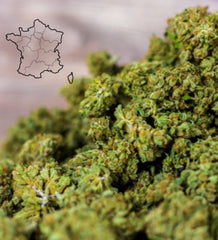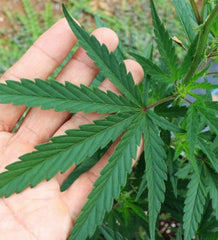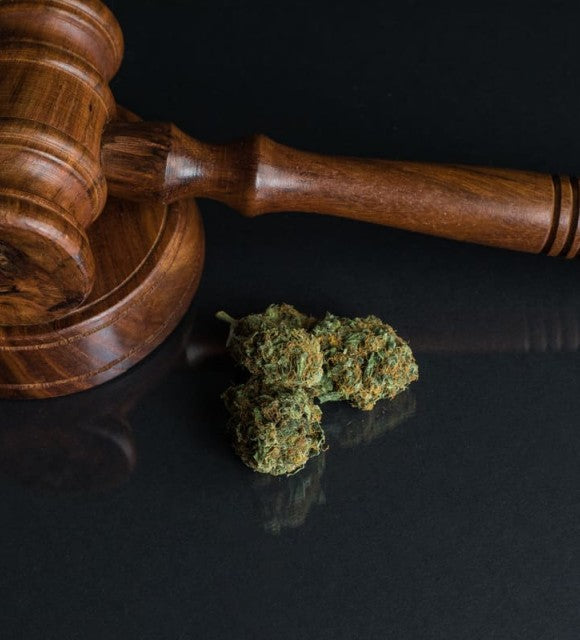
Is CBD illegal in France?
A ban on cannabis in principle
When it comes to cannabis, the principle is clear. Cannabis (THC) is in fact prohibited, in accordance with the public health code. The law considers it a narcotic. Its possession, even in small quantities, is illegal, and therefore liable to criminal sanctions. The penal code does not actually specify any minimum quantity [1].
However, it should be noted that there is one exception to this principle. It concerns medical cannabis. Nothing is definitive on this subject yet. In October 2019, the National Assembly authorized a two-year experiment on 3,000 patients with serious illnesses. The future will undoubtedly enlighten us.
CBD, THC and Cannabis: A distinction is necessary
Cannabis is made up of around a hundred molecules, the main ones being cannabidiol (CBD) and tetrahydrocannabinol (THC).
Several studies have proven that it is THC that is responsible for the psychoactive effects [2] . The Court of Justice of the European Union admitted this in its judgment in case C-663/18, known as Kanavape, delivered on November 19, 2020 [3] . As for CBD, it does not induce any side effects such as anxiety , paranoia or addiction.
Both CBD and THC molecules are present in cannabis, but there are techniques such as CO2 extraction to extract and separate one from the other. CBD is therefore not considered a narcotic. It is this specificity that justifies the various laws related to cannabis.
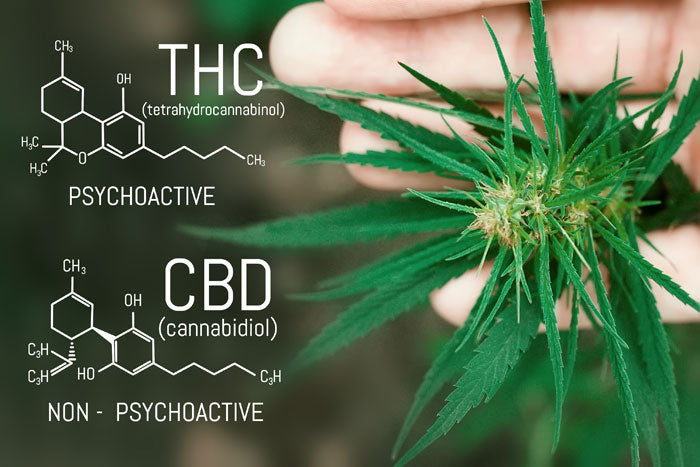
Legal framework for CBD in France
The legal framework for CBD in France is determined by three main laws: The Public Health Code, the decree of August 22, 1990 and the decree of February 22, 1990.
The Public Health Code
Article R5132-86 of the Public Health Code, in its first paragraph, stipulates that "The production, manufacture, transport, import, export, possession, offer, transfer, acquisition or use of cannabis, its plant and its resin, products containing it or those obtained from cannabis, its plant or its resin are prohibited."
In view of the provisions governing narcotic substances, this ban concerns cannabis, the plant, the resin, and tetrahydrocannabinols.
However, this text of article R5132-86 of the Public Health Code, has provided in its paragraph II, a mechanism of exemption for "certain varieties of cannabis devoid of narcotic properties or products containing such varieties".
This exemption mechanism was put in place through the adoption of the decree of August 22, 1990.
The decree of August 22, 1990.
This decree determines the cannabis varieties that are subject to exemption. Therefore, any product containing CBD extracted from hemp is prohibited, unless it appears on the exemption list established for this purpose.
This list is located in article 2 of the said decree [4] and includes 18 varieties, all derived from the Sativa L variety. We can cite, among others, the Carmagnola variety, Fedora 19, Fibrimon 56 and Santhica 27 etc.
Furthermore, according to this same decree, only the fibers and seeds of these varieties are concerned. They must also comply with two essential conditions:
- The THC content of these varieties must not exceed 0.20%
- The method of determining THC content must comply with the law.
The decree of February 22, 1990
In France, a list of regulated or prohibited substances, except for medical reasons, is drawn up and governed by the decree of February 22, 1990. These substances are in fact considered narcotics. This list is continually updated to also include synthetic drugs.
French legislation for consumers
To better understand the legislation on the consumption of CBD in France, we will first discuss the legal framework for vaping e-liquid extracted from CBD, then the provisions relating to sport and finally the therapeutic use of CBD.
Vaping CBD-Extracted E-Liquid: What Does the Law Say?
There is vaping legislation that applies to e-liquids extracted from CBD. French law allows adults to vape e-liquids [5] with CBD. If you are a minor (a person under 18 years old), you are subject to the law if you vape e-liquids extracted from CBD.
Furthermore, in educational establishments and structures dedicated to the reception, training and accommodation of minors, vaping is strictly prohibited. This is the case in closed means of collective transport and in closed and covered workplaces for collective use, in accordance with the decree of April 27, 2017 [6].
The use of CBD in French sport
Regarding the sporting context, it should be noted that since January 1, 2018, CBD is no longer listed among the doping products of the Anti-Doping Agency. Consequently, through Decree No. 2018-1283 of December 27, 2018, France removed the CBD molecule from the list of substances prohibited in sport on its territory.
It appears that French athletes can use CBD without being concerned by anti-doping controls.
Therapeutic use of CBD
Recognition of the therapeutic properties of CBD has been slow to materialize, as legislators fear that this could lead to the legislation of cannabis. In France, for example, there are only two medications made with CBD that are authorized [7] . These are Sativex and Epidiolex.
Sativex, also containing THC, is intended for patients suffering from multiple sclerosis. However, it is not available in pharmacies in France because an agreement on the price for its state reimbursement has not been reached.
As for Epidiolex, it contains no trace of THC. It is recommended for epilepsy if there is no other suitable medication available.
However, before any prescription, it would first be necessary to wait for the issuance of a marketing authorization (MA) by the National Agency for Health and Medicines (ANSM) [8].
It should be noted that this authorization is only temporary [9].

What about legislation for producers?
Hemp producers are subject to strict legislation. It prohibits them from re-sowing their own seeds. Hemp producers must obtain their seeds from an approved organization called the "Central Cooperative of Hemp Seed Producers (CCPSC) [10] ", in accordance with their production contract.
They are also subject to control by the competent services, for the purpose of verifying the THC level (which cannot exceed 0,3%) and the variety of hemp cultivated.
Legislation for resellers
Based on a decree of December 2018, the Interministerial Mission for the Fight against Drugs and Addictive Behavior (MILDECA) listed to CheckNews three cumulative conditions for the marketing of CBD varieties [11] .
These, she stated, must be included in the exhaustive list included in Article 2 of the decree of August 22, 1990. Furthermore, the cannabis plant must have a THC content of less than 0,3%. Furthermore, only its seeds and fibers may be used.
As for the finished product such as oils, creams and cookies, there must be no trace of THC, whatever the level.
As a result, all retailers who sell CBD products, even with a minimal amount of THC, are in breach of the relevant legal provisions. Logically, cannabis flowers and leaves are also prohibited from sale [12].
So this clarifies the misinterpretations of the law by CBD shop owners. So, why aren't they being prosecuted? The answer is simple: It's actually very difficult, regardless of the extraction method, to achieve 100% CBD and 0% THC in a finished hemp product.
But the position of certain international institutions, and especially that of the Court of Justice of the European Union, will probably argue for the relaxation of legislation in this area.
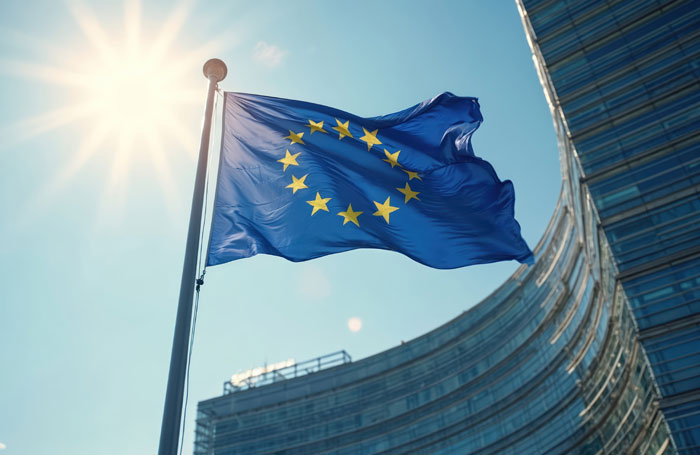
The influence of certain international organizations and the European Court
French law on CBD legislation is in fact influenced by the positions taken by international organizations as well as those of the European Union community legislator.
Influence of certain international organizations
The WHO (World Health Organization) took up the issue of CBD in 2017. This organization has widely defended that CBD does not pose a threat to health and does not cause addiction. It has also removed it from the list of doping products and recommended further research into its therapeutic virtues [13].
Furthermore, it is worth noting that CBD is not included in the UN Convention on Drugs [14]. Needless to say, the UN body excludes CBD from the category of narcotics.
As for the position of the Court of Justice of the European Union, it will strongly influence French legislation on cannabis in the years to come.
The position of the Court of Justice of the European Union
The 2003 Hammarsten judgment [15] handed down by the Court of Justice of the European Union had already reflected hostility to the restriction undertaken by certain States of the Union, despite the standards developed by EU Community law.
The main issue is in fact linked to the risk of disparity of legislation within the EU, thus compromising the principle of the free movement of goods. In this matter, French regulations have been deemed contrary to European Union law [16].
Better still, on November 19, 2020, we witnessed a major decision in Community law, through a judgment rendered in case C-663/18, known as Kanavape [17].
The case concerned whether France's ban on the consumption or importation of CBD oil complied with EU regulations.
The question is worth asking because in France, the various commercial and industrial operations involving hemp are limited to seeds and fibers, while the production of oil involves the whole cannabis plant.
The ruling declared that CBD oil, in its current form, did not constitute a narcotic. In this ruling, the Community judge also reaffirmed the principle of the free movement of goods.
The French authorities have thus taken note of this ruling and have promised to take the judge's conclusions into account.
What should we remember?
The legislation in force in France with regard to CBD requires compliance with certain provisions, namely:
- Never present CBD as a medicine
- CBD is banned from advertising, under this order
- CBD products must be derived from varieties specified by law
- Cultivated hemp plants must have a content of less than or equal to 0,3%
- Finished CBD products containing more than 0% THC are illegal
As you might have guessed, there is a real legal uncertainty surrounding CBD legislation. This uncertainty is further compounded by the disparity in provisions and enforcement in this area in certain parts of France.
To answer the question: is CBD legal in France? The answer is yes, CBD is 100% legal. The production, sale, and consumption of CBD are legal, provided you comply with the applicable regulations. These regulations apply to suppliers, sellers, and consumers.
Today, CBD is widely regarded for its relaxing, stress-relieving, and pain-relieving properties. THC, on the other hand, remains illegal in France and many other European Union countries, and that's unlikely to change anytime soon.
[1] https://www.legifrance.gouv.fr/affichCodeArticle.do?idArticle=LEGIARTI000006417724&cidTexte=LEGITEXT000006070719&dateTexte=20020101
[2] https://www.rnd.de/politik/furs-kiffen-nach-karlsruhe-richter-halt-verbot-fur-verfassungswidrig-ZO3SVKUJMZEZZF6WL2A3ARABK4.html
[3] https://www.drogues.gouv.fr/actualites/cannabidiol-cbd-point-legislation
[4] https://professeur-cbd.com/apprendre/legislation
[5] Remarks made by the Minister of Health at the end of November 2017, https://agauche.org/2020/07/20/lessor-du-cbd-en-france-un-pas-de-plus-vers-la-legalisation-du-cannabis/
[6] https://lentreprise.lexpress.fr/rh-management/droit-travail/vapoter-au-travail_1735126.html
[7] https://www.syndicat-simples.org/la-production-et-lutilisation-du-chanvre-quel-cadre-juridique-en-france/
[8] Decree No. 2013-473 of June 5, 2013
[9] https://professeur-cbd.com/apprendre/epilepsie
[10] Senat.fr
[11] https://www.liberation.fr/checknews/2019/07/04/cannabis-cbd-un-an-apres-ou-en-est-on_1737928
[12] https://www.liberation.fr/checknews/2019/07/04/cannabis-cbd-un-an-apres-ou-en-est-on_1737928
[13] https://www.who.int/
[14] https://www.liberation.fr/france/2020/11/19/interdiction-du-cbd-en-france-camouflet-europeen-et-fumee-verte-pour-le-marche_1806070
[15] https://eur-lex.europa.eu/legal-content/FR/TXT/?uri=CELEX%3A62001CJ0462
[16] https://www.village-justice.com/articles/les-usages-chanvre-cannabidiol-lecture-jurisprudence-communautaire,37231.html
[17] https://www.village-justice.com/articles/les-usages-chanvre-cannabidiol-lecture-jurisprudence-communautaire,37231.html



